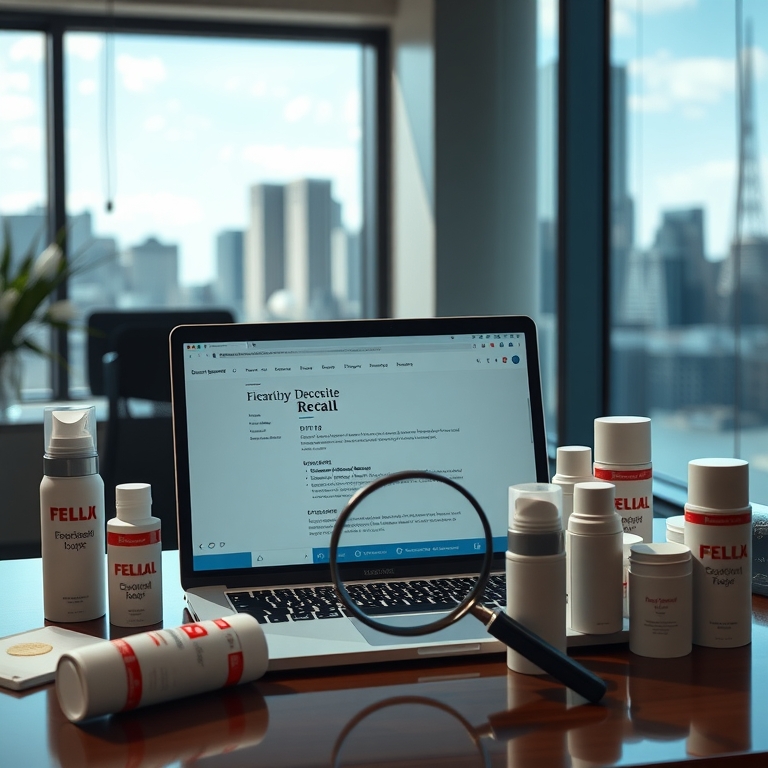In a significant move that has drawn attention from both consumers and industry stakeholders, the U.S. Food and Drug Administration (FDA) has issued a recall of several popular deodorant brands due to contamination concerns. This unexpected development has sent ripples through the market, prompting both retailers and consumers to reevaluate their choices and the safety of everyday personal care products.
The recall, which was announced earlier this week, affects a range of products from multiple well-known brands. The FDA’s decision was triggered by the discovery of potentially harmful contaminants within these deodorants, raising serious health concerns. The contaminants, reportedly found during routine quality control checks, include substances that could cause skin irritation or more severe health issues if used over an extended period. The FDA has not disclosed the specific contaminants publicly, citing ongoing investigations, but emphasized the urgency of removing these products from shelves to safeguard public health.
For consumers, the recall has sparked a wave of anxiety and uncertainty, particularly because deodorants are a staple in personal hygiene routines. Many people rely on these products daily, often selecting brands based on trust and reputation. The news has understandably caused concern, as consumers now question the safety of products they have used for years. Social media platforms have been buzzing with discussions and personal stories from individuals who have experienced adverse reactions after using the recalled products, further amplifying the sense of urgency among the public.
Retailers, too, are feeling the impact of the recall. With shelves suddenly emptied of popular brands, stores face the dual challenge of managing inventory and addressing customer concerns. Many retailers have initiated returns and refund processes, offering consumers the opportunity to bring back affected products. This proactive approach aims to maintain customer trust and demonstrate a commitment to consumer safety. However, the logistics of processing large-scale returns and refunds pose significant operational challenges, requiring quick adaptation and efficient communication with both customers and suppliers.
On the industry front, the recall has reignited discussions about regulatory oversight and quality control in the personal care sector. Manufacturers are under increasing scrutiny to ensure their products meet stringent safety standards, with the FDA’s actions serving as a stark reminder of the importance of rigorous testing and transparency. This incident has highlighted potential vulnerabilities in the supply chain and quality assurance processes, prompting many companies to conduct internal reviews and reassess their safety protocols. Industry experts are calling for more robust regulations and more frequent inspections to prevent similar incidents in the future.
For the affected brands, the recall represents a substantial reputational and financial setback. In a market where brand loyalty is vital, the damage to consumer trust can have long-lasting implications. Companies are now faced with the task of rebuilding their reputation, which may involve increased transparency, improved safety measures, and, potentially, rebranding efforts. Some brands have already begun outreach efforts, issuing public statements expressing their commitment to consumer safety and outlining steps being taken to address the issue. These efforts are crucial in mitigating the impact of the recall and regaining consumer confidence.
The recall also brings to light broader implications for the personal care industry. As consumers become more aware of the ingredients in their products, there is a growing demand for safer, more natural alternatives. This shift in consumer preferences is likely to influence product development and marketing strategies moving forward. Companies may need to innovate and prioritize clean, sustainable ingredients to meet evolving consumer expectations and rebuild trust.
In the wake of the recall, consumer advocacy groups have been vocal about the need for greater transparency and accountability in the industry. They argue that consumers have the right to know exactly what is in their personal care products and that companies should be held accountable for any lapses in safety standards. These groups are calling for more stringent regulations and labeling requirements to ensure that consumers can make informed choices.
The FDA, for its part, has reassured the public that it is taking every necessary step to address the situation. The agency is working closely with manufacturers to identify the source of contamination and prevent future occurrences. Additionally, the FDA is conducting thorough reviews of the affected products and has pledged to keep the public informed as more information becomes available. This commitment to transparency and consumer safety is crucial in restoring confidence among consumers and stakeholders alike.
In conclusion, the FDA’s recall of multiple deodorant brands over contamination concerns has sent shockwaves through the personal care industry. It serves as a potent reminder of the importance of rigorous safety standards and the need for ongoing vigilance in product testing and quality assurance. As the industry grapples with the fallout, it is clear that both consumers and companies are entering a new era of heightened awareness and accountability. While the immediate focus remains on addressing the recall, the long-term implications may lead to a safer, more transparent marketplace where consumer trust and safety are paramount.

Leave a Reply